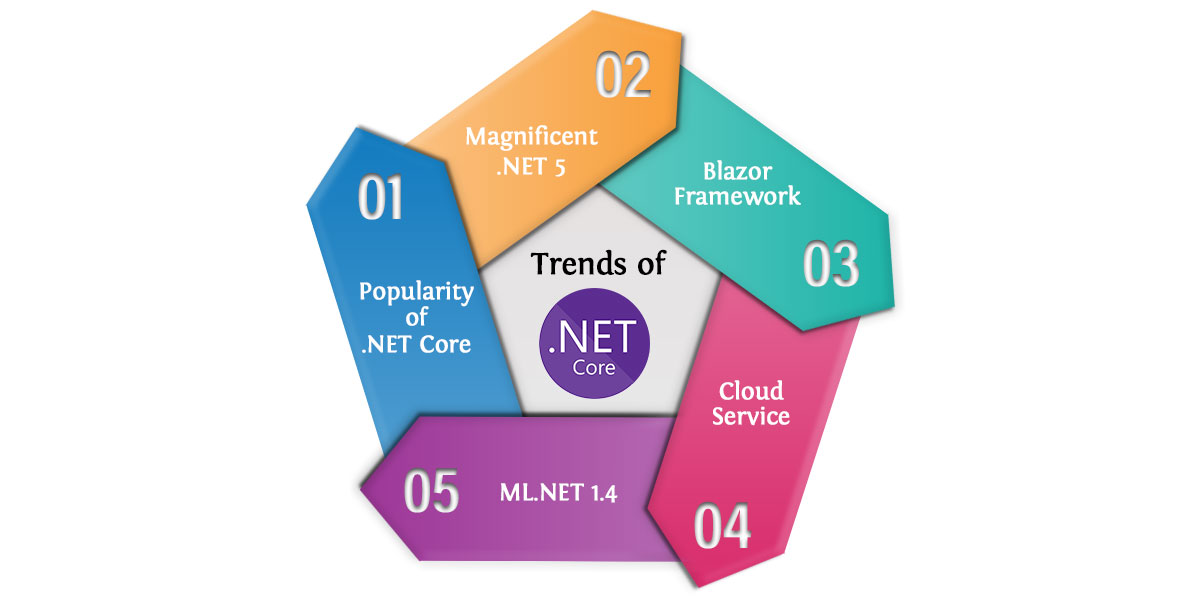Top 5 Trends of .NET Core - DotNet Trends in 2020

 No doubt, Microsoft has been considered as one of the top corporations to deliver unmatchable tools for developers, and .NET Core is the proof of it. After reading .NET benefits from our previous blogs, you have probably understood the importance of .NET in making business applications. With .NET Core, it becomes easy to say goodbye to all the stiffness that comes in the developer’s path while making powerful applications, complex web applications, and webpages. In 2020, Microsoft has planned to do something different with the .NET Core and bought several new trends at the start of the year. In today’s blog, we discuss these trends in detail;
No doubt, Microsoft has been considered as one of the top corporations to deliver unmatchable tools for developers, and .NET Core is the proof of it. After reading .NET benefits from our previous blogs, you have probably understood the importance of .NET in making business applications. With .NET Core, it becomes easy to say goodbye to all the stiffness that comes in the developer’s path while making powerful applications, complex web applications, and webpages. In 2020, Microsoft has planned to do something different with the .NET Core and bought several new trends at the start of the year. In today’s blog, we discuss these trends in detail;
The Popularity of .NET Core
The .NET Core has already gained a substantial reputation since its release due to excessive tools, libraries, and frameworks. It has the potential to support ASP.NET, C#, F#, ML.NET. Xamarin, WinForms, WPF, and entity framework are all the important aspects of .NET Core. Moreover, it contains ahead of time compilation (AOT), garbage collection (GC), just in time (JIT) collection, and a base class library. All these collections and elements create a .NET Core intelligible framework in contrast to other competitors. Being a lighter and flexible framework, .NET Core 3 is suitable for cloud installations where it is a high demand for density and speed.
The Magnificent .NET 5
The .NET 5 is considered as a magnificent trend of .NET Core as it unpacks the option to shift towards Blazor, React, Angular as well as Vue SPA frameworks. Furthermore, .NET 5 has the following things;
- EF Core: Entity framework Core will be going to swap EF 6.
- ASP.NET Core: ASP.NET Core will be going to swap ASP.NET.
- MSIX: A better replacement of MSI installer.
- ASP.NET Core MVC: It combines ASP.NET Core and Web API.
- JSON Document: It is a document library extracted from System.Text.Json.JsonDocument and will replace JSON.NET.
Blazor Framework
It is a free and open-source framework that enables the coder to build interactive features by using C#. Besides this, the dominating components of Razor and HTML allow the programmer to write both the server and client code. Routing, dependency injection, layouts, server-side rendering, JS interop make the Blazor more interesting framework as the developers write the code from the web and run on any browser through Web Assembly.
Cloud Service
Azure Cloud service from Microsoft isn’t new anymore. The way it allows the users to access their documents, tools, and data from anywhere and enables them to scale their business landscape is astonishing that has never been possible before. In conclusion, it delivers big data, artificial intelligence, and data analytic solutions required for exploring future opportunities.
ML.NET 1.4
Another amazing trend from .NET Core is ML.NET 1.4 that has both Command-Line Interface (CLI) and Model Builder. With ML.NET 1.4, developers can integrate machine learning tools into their existing code to build custom-based ML models. ML.NET 1.4 permits the .NET applications to include all the surprising features of the deep neural network, artificial intelligence, and machine learning.






